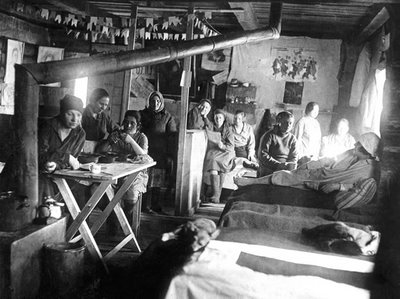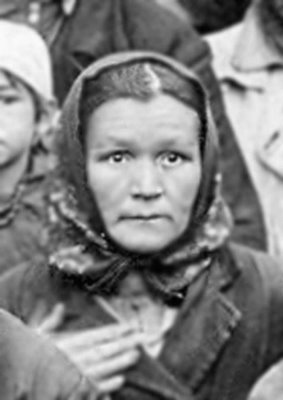Gulag: Soviet Forced Labor Camps and the Struggle for Freedom

By Aussiegirl
Here is an excellent online museum dedicated to the Gulag. It gives those who are unable to visit the site of the actual museum, located in Perm, Russia, a chance to experience the reality of these terrible places. The introduction describes the museum this way:
Perm-36 closed in 1988, one of the last camps to close in the Soviet Union. In 1991, Memorial Society activists, who wanted to preserve a forced-labor camp to serve as a memorial to the Gulag victims, organized to save the former camp.
By the early 1990s, Perm-36 lay in ruins. KGB officicals had destroyed much of the facility after Ukrainian Television crews filmed and broadcast the facility where internationally renowned (Ukrainian) poet Vasyl Stus had died from neglect in 1985. Reconstruction efforts allowed the Museum to open in 1996, although rehabilitation of the early wooden structures continues today.
Today Perm-36 is open to the public as a historic site and museum.
In addition to the online exhibit, there is a traveling version that recently was shown at Ellis Island. Future exhibit sites include Boston, California, Georgia and Washington, D.C. among others. Check the website for details.
I've quoted below from one of the pages that described what sorts of crimes might result in sentencing to the gulag. On this subject I'd like to add that my mother, as a young twenty-year-old mother of an infant, was once late to work because her baby was sick and she had no one to leave her with. She received a strong warning that further tardinesses would result in arrest and imprisonment. My mother, never one to be able to restrain herself, expressed her outrage at such injustice. "How long will they keep torturing us", she cried, to the horrified expressions of all those present.
Although my mother was a teacher assigned to a town and taught the children of the collective farm, she was not eligible to participate in the collective nursery. As a result she had no choice but to bring my sister to work and leave her in the school office asking a woman caretaker to keep an eye on her. When that was no longer allowed she was forced to leave the baby at home, swaddling her in order to keep her from smothering herself in the bedclothes. When lunchtime came she would rush back home to feed and change her baby and make sure she was all right. It was this kind of circumstance that forced her to be late one day. But that was of no concern to Stalin. That was of no concern to the state that purported to elevate the working man. The "dictatorship of the proletariat" was in reality the exploitation and enslavement of the proletariat to an all-powerful state that disposed of people as if they were things.
I'm sure that if my mother had not managed to escape the Soviet Union during the chaos of the war that she would have ended up in a gulag. She was always simply too outspoken and frank for her own good. After she had uttered her emotional protest my father railed at her to be quiet or she would get them all arrested. Luckily for her the principal of the school was a decent man who told her to never say anything similar again, because she would get them all arrested.
Yes, a small incident you might say. But sometimes it is the small incidents that are the most instructive because they are incidents that we can identify with and understand on a personal level, while it is difficult to imagine being one of the brave dissidents who knowingly sacrificed their freedom for their beliefs.
I've also included some photographs and descriptions of what life was like for women in the gulag. As harsh as life was for men, as often is the case, women suffered particular hardships.
As to the climate in these freezing hell holes. My mom tells me of a rhyme that was coined by the inmates of Kolyma, one of the most notorious of the gulags located the northernmost and coldest region. The words rhyme in Russian, but in translation they go thusly:
Kolyma, Kolyma.
You distant planet.
Twelve months of winter,
And the rest is summer
And another piece of graffitti in a Soviet prison cell when like this:
Who hasn't yet been here will yet taste it.
Who has been here will never forget it.
Gulag: Soviet Forced Labor Camps and the Struggle for Freedom
Have you ever been late to work?
In the Stalin era, a person who arrived late to work three times could be sent to the Gulag for three years.
Have you ever told a joke about a government official?
In the Stalin era, many were sent to the Gulag for up to 25 years for telling an innocent joke about a Communist Party official.
If your family was starving, would you take a few potatoes left in a field after harvest?
In the Stalin era, a person could be sent to the Gulag for up to ten years for such petty theft.
Maria Tchebotareva
Trying to feed her four hungry children during the massive 1932-1933 famine, the peasant mother allegedly stole three pounds of rye from her former field—confiscated by the state as part of collectivization. Soviet authorities sentenced her to ten years in the Gulag. When her sentence expired in 1943, it was arbitrarily extended until the end of the war in 1945. After her release, she was required to live in exile near her Gulag camp north of the Arctic Circle, and she was not able to return home until 1956, after the death of Stalin. Maria Tchebotareva never found her children after her release.
Courtesy of the Gulag Museum at Perm-36.



3 Comments:
Thank you.
It seems like so few people know. It is endlessly fascinating to me, however, that such things could have been done.
The very least that we can do is remember always the suffering, the injustice, and the hypocrisy.
Everyone should read "The Gulag Archipelago" by Solzhenitsyn. It is a long read but there is nothing that reveals the reality of those times better. For a short read try "One Day in the Life of Ivan Denisovich" also by Solzhenitsyn.
Frankly, I get angry at people who don't know history. Their willful ignorance often ends up endangering our generation when we repeat the mistakes of those in the past.
Bah every true Soviet can tell you that the Siberian camps were NOT a method of punishment but the best way to contribute with the means defend the soviet motherland against the fascist agressor.
Post a Comment
<< Home